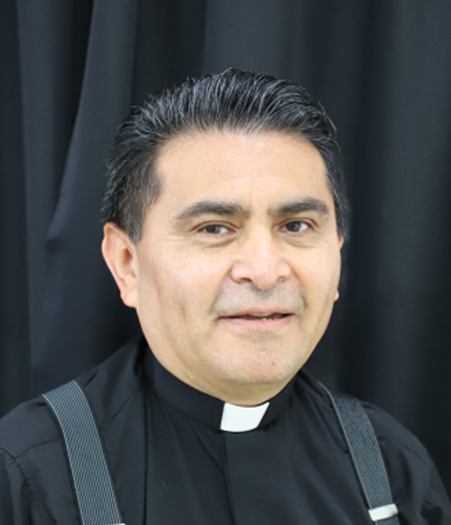24rd Sunday of Ordinary Time Year A
 Reading I: Sirach 27:30-28:7
Reading I: Sirach 27:30-28:7
Responsorial Psalm: 103:1-2, 3-4, 9-10, 11-12
Reading II: Romans 14:7-9
Gospel: Matthew 18:21-35
Spiritual Reflections on Sunday’s Readings (Lectura En Español)
Breaking the Chain
Forgiveness. It is the inner meaning of Sunday’s Mass.
Our culture has some pretty diverse understandings of what forgiveness means. For some it is an condescending act performed only by one person who is higher than the other—a King or Queen, who leans down to grant pardon.
For others it means “I forgive the one who hurt me but I can never forget.” Under such an attitude, one will remain angry forever but will never act upon it.
Which leads to another possible meaning, that a person might choke back their hurt and anger by a sheer act of the will. They may have been savaged by someone, but will choke down their reaction.
So what is the real basis of forgiveness? On Easter Sunday of 1960, that great seer and lover of God, Dag Hammarskjöld, wrote an interpretation that moved me:
Forgiveness breaks the chain of causality because he who ‘forgives’ you—out of love—takes upon himself the consequences of what you have done. Forgiveness, therefore, always entails a sacrifice.
The price you must pay for your own liberation through another’s sacrifice is that you in turn must be willing to liberate in the same way, irrespective of the consequences to yourself.
So much to think about in these brief words.
The First Reading, from the Book of Sirach, tells how hateful wrath and anger are, how the sinner “hugs them tight,” a wonderful image. To let them go and forgive is such a good idea, but we wonder why it is the right one. Maybe one needs to be angry.
The Psalm speaks beautifully about God’s forgiving love: God is kind and merciful, slow to anger and rich in compassion. And the Second Reading says we ought to live not for ourselves but for others. We should imitate God. But again, how?
The Gospel illustrates what forgiveness means. Please read the story by pressing on the word Gospel there is not space here to repeat the tale of the ungrateful servant.
Underneath this question is the answer we are looking for. The real motivation for forgiveness is gratitude, loving gratitude. If someone has had pity on me out of love, then my authentic reaction will be deep appreciation. I will want to give to someone else the liberation I have received, especially if that person has hurt me. I will want to pass the gift on.
God has loved us so kindly; can we feel grateful? Can we halt the cycle of retribution and pass along love instead of hate?
As you and I receive Christ’s presence this Sunday, let us sense his forgiving love signified so deeply in the sacraments. Let us allow our gratitude to flow out and become the same forgiving love toward others.
Santo Nombre Iglesia Católica Lecturas del pastor Reflexión – 17 de septiembre de 2023
Domingo 24 del Tiempo Ordinario Año A
 Lectura I: Sirach 27:30-28:7
Lectura I: Sirach 27:30-28:7
Salmo responsorial: 103:1-2, 3-4, 9-10, 11-12
Lectura II: Romanos 14:7-9
Evangelio: Mateo 18:21-35
Espiritualidad de las Lecturas
Las lecturas de este domingo nos traen el recuerdo de las celebraciones que nos ha ofrecido el calendario litúrgico estos días pasados, como ha sido la Exaltación de la Cruz y Nuestra Señora de los Dolores. En muchas comunidades se celebran fiestas en honor de Cristo y de su Madre.
La enseñanza de la Palabra de Dios es un tanto paradójica: poder sentir el privilegio de acompañar al Señor cargados con el peso de nuestros sufrimientos. Pero no se nos llama a una espiritualidad masoquista, sino a sabernos acompañados en nuestras pruebas por Quien ha decidido de manera voluntaria y amorosa tomar nuestras dolencias y hacerse solidario con nuestros dolores.
Naturalmente, como le sucedió al discípulo Pedro, no deseamos la prueba ni el dolor, e intentamos huir de ellos; sin embargo, hay un secreto sorprendente cuando los asumimos de manera teologal: “Mirad, el que quiera salvar su vida la perderá; pero el que pierda su vida por mí y por el Evangelio la salvará”.
San Ignacio de Loyola le decía al joven Francisco Javier: “¿De qué le sirve a uno ganar el mundo entero si se pierde o se arruina a sí mismo?” El atractivo de los bienes de este mundo puede nublar la mente y esclavizar el corazón. Mas si ponemos los ojos en el Crucificado, todo se puede sufrir, nos dice Santa Teresa de Jesús.
La Palabra de Dios nos asegura: “Invoqué el nombre del Señor: «Señor, salva mi vida”. Y el orante reconoce: “Arrancó mi alma de la muerte, mis ojos de las lágrimas, mis pies de la caída”. El profeta afirma: “Mirad, el Señor me ayuda”.
Una consigna es tener el oído atento para saber escuchar lo que agrada a Dios, y sobre todo para percibir que no vamos solos por el camino de la existencia, sino que Jesús se ha comprometido a acompañarnos; y nos dice: “El que quiera venirse conmigo, que se niegue a sí mismo, que cargue con su cruz y me siga”. Quien se fíe del Señor no quedará defraudado. Puede dar pudor afirmar que Jesucristo se hace solidario con los que sufren, como si con esto se buscara evadirse de esos sufrimientos. El apóstol Santiago nos invita a ser mediación de la compasión del Señor para quienes tienen necesidad: “Supongamos que un hermano o una hermana andan sin ropa y faltos del alimento diario, y que uno de vosotros les dice: «Dios os
ampare; abrigaos y llenaos el estómago», y no les dais lo necesario para el cuerpo; ¿de qué sirve? Por las obras, te probaré mi fe”.
Tenemos la llamada a mirar la Cruz de Cristo, a adorarla y a ser signos compasivos para los que hoy son reflejo del Crucificado.
